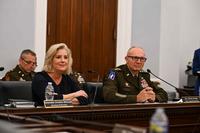The holdup on the submission of Defense Secretary Jim Mattis' new strategy for the nation's longest war in Afghanistan has come from the White House, according to Joint Chiefs Chairman Gen. Joseph Dunford.
Mattis had promised to deliver the plan by mid-July in response to the long-standing request for 3,000 to 5,000 additional troops made by Army Gen. John Nicholson, commander of U.S. Forces-Afghanistan and the NATO Resolute Support Mission.
However, Dunford said July 23 at the Aspen Security Forum in Colorado, "We're not going to do that until after the president has decided on the strategic framework within which our support of the Afghan security forces takes place."
In the meantime, Mattis, who was on vacation last week, has also had to deal with the freelance strategy prescriptions backed by some White House officials.
Related content:
- Trump Meets With Troops to Hear Ideas on Afghan Strategy
- Mattis Gets Authority in Afghanistan, But Trump Remains Engaged
- Trump Gives Mattis Authority to Set Troop Levels in Iraq, Syria
- McCain Scolds Mattis for Delay on Afghan War Strategy
Earlier this month, White House Chief Strategist Steve Bannon went to the Pentagon with a proposal from Erik Prince, founder of the Blackwater security firm, calling for the creation of an "American viceroy" for Afghanistan and the use of mercenaries. According to The New York Times, Mattis "listened politely" and sent Bannon on his way.
On Monday, Sen. John McCain, R-Ariz., chairman of the Senate Armed Services Committee, issued a statement blasting the White House for the delay on a new strategy for Afghanistan.
"More than six months after President Trump's inauguration, there still is no strategy for success in Afghanistan," McCain said. "Eight years of a 'don't lose' strategy has cost us lives and treasure in Afghanistan. Our troops deserve better."
If the White House continues to delay, McCain said that in September he would offer an amendment to the defense budget "based on the advice of some our best military leaders that will provide a strategy for success in achieving America's national interests in Afghanistan."
Dunford said in Aspen that Mattis is working up a plan that would take a more regional approach to combating the Taliban and the emergence of a terrorist offshoot of the Islamic State of Iraq and Syria, called Islamic State-Khorasan Province.
The key player in the regional approach is neighboring Pakistan, Dunford said. The new strategy won't work "unless we have a higher degree of cooperation from Pakistan," he said, but Pakistan is in turmoil over a corruption scandal in which the courts last week forced Prime Minister Nawaz Sharif to resign.
Sharif responded by having his Pakistan Muslim League, which holds a majority in parliament, nominate a caretaker prime minister in Shahid Khaqan Abbasi, a former oil minister. Abbasi would hold the seat until Sharif's brother, Shahbaz, could be elected to parliament in two months and take over as prime minister.
In June, President Donald Trump authorized Mattis to set the Force Management Level, or troop level, in Afghanistan, where about 8,400 U.S. troops currently are serving in the train, advise and assist role with the Afghan National Security Defense Forces. Trump has given similar authority to Mattis in Iraq and Syria.
If Mattis were to sign off on sending additional troops to Afghanistan, their main purpose would be to train the Afghans and they would not be subject to arbitrary timelines for their withdrawal, Dunford said.
"When you put artificial timelines on it, it doesn't work," he said.
Over the weekend, The Wall Street Journal reported that the Afghanistan strategy delay stemmed from disagreements among top White House advisers. Army Lt. Gen. H.R. McMaster, the White House national security adviser, reportedly backs sending more troops while other officials are opposed.
"Unable to agree on a plan to send up to 3,900 more American forces to help turn back Taliban advances in Afghanistan, the White House is taking a new look at what would happen if the U.S. decided to scale back its military presence instead, according to current and former Trump administration officials," The WSJl reported.
-- Richard Sisk can be reached at Richard.Sisk@Military.com.




























